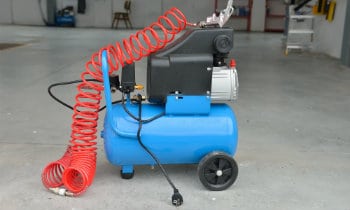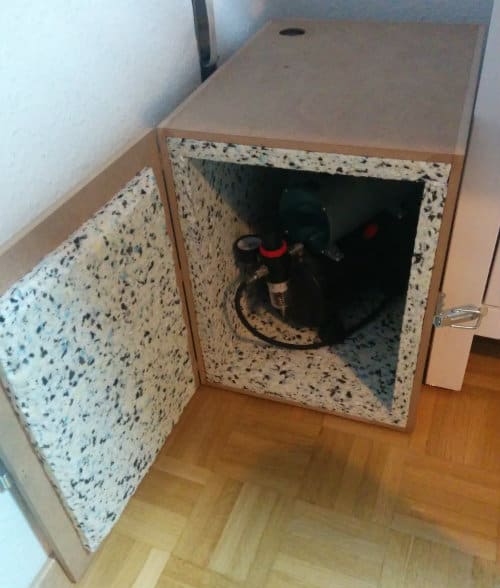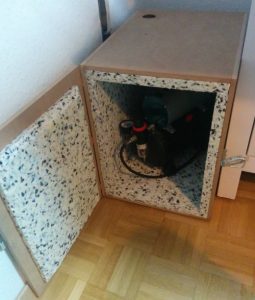Air compressors are loud–typically putting out 70 – 80 decibels of noise. This is not quite up to hearing loss levels (85 decibels and higher), but it might get uncomfortable if you are working close to one for extended periods of time.
An air compressor, along with even a few of the multitude of available attachments, is one of the most versatile tools you can have. A quiet compressor is just much more pleasurable to use. Here are some ideas you can use to make your compressor quieter.
 Air Compressor
Air Compressor
8 Ways to Make Your Air Compressor Quieter
It is impossible to make an air compressor completely silent, But by using one or more of these ideas, you can make yours much more bearable.
1) Set the Compressor on an Anti-Vibration Mat
Air compressors vibrate. Period. The combination of a relatively light machine and a powerful motor running at fairly high speeds with lots of torque. These vibrations will produce low-frequency sound which is more difficult to contain. Placing your compressor on an anti-vibration mat serves two purposes.
- The mat prevents the machine from vibrating on the floor. If the compressor is in the house on a wood floor, those vibrations will travel through the floor into other rooms as flanking noise. The mat also prevents that low-pitched machine hum in the room. (Note: Individual anti-vibration pads under each compressor foot will serve the same purpose.)
- Anti-vibration mats also eliminate any noise that reflects from a hard floor under the machine.
You can buy rubberized anti-vibration mats and pads that will provide the best result. But keep in mind that anything under the compressor–such as old carpet, folded drop sheets or towels, or any sound-absorbing material–will reduce noise and vibrations.
2) Soundproof Cover
One of the easiest and most inexpensive ways to make your air compressor quieter is to cover it with a soundproof blanket. (When you look for soundproof blankets you will find moving blankets. Because they are thick and absorb sound.) This option works quite well for electric air compressors.
Most moving blankets will let air flow through them, so you can just cover the entire machine without worrying about the air intake. Although you should make sure that the cover is not right tight to the intake. Some covers are fireproof and some have a very tight weave and will keep air from flowing through them. In that case, you will have to provide an opening–even at floor level–for air intake.
You can still use this method for gas motor-powered compressors if you like. You will have to take into account that gas motors spew hot exhaust, and have more moving parts. Make sure that the exhaust vents outside the cover and you provide something to keep it away from the pulleys and belts.
There are also factory-made covers that may work well for you.
Note: I have never used or even seen a factory-made compressor cover. So I have no opinion, other than they seem way more expensive than a moving blanket.
3) Wall Soundproofing
If your air compressor is stationary, add some soundproofing or sound-absorbing material to the walls behind and around it. As with portable generators that are stationary, most air compressors are positioned against the garage or shop wall, or in a corner to keep them out of the way. Any hard wall will reflect noise, adding to the sound you hear from your compressor.
Hanging soundproofing material around the compressor will reduce noise and echoes. You do not need to be real fancy. Any soft sound-absorbing material like moving blankets, anti-vibration mats, polyester acoustic panels, or 2″ foam acoustic panels will work.
If you have the option, inclination, and time, build an extra wall around the compressor, leaving the front open. Line the entire enclosure with blankets, mats, or acoustic panels to absorb more sound.
You may even consider adding a lid over the compressor and a door. Make sure the lid is solid so when you pile stuff on top, it will not collapse on your compressor. Leave enough room inside to allow access to switches, gauges, drains, and of course, air line couplers.
4) Keep the Compressor Away From You
When it comes to compressor noise, distance and mass are your friends. Just extra distance alone can reduce noise levels by up to 25%. This little chart shows how much and how quickly.
- At 1 meter (3,3′) from compressor noise is 90 decibels.
- At 2 meters (6.6′) from compressor noise is 84 decibels.
- At 4 meters (13.1′) from compressor noise is 78 decibels.
Think how much quieter it will be in another room or even outside with a wall or two between you and the noise. You will get virtually the exact same air pressure at the end of 100 foot hose as at the end of a 25 foot hose. So haul hose around–not the compressor. And modern air hose is very light compared to the heavy rubber hose of years ago.
5) Make the Air Intake Quieter
On most compressors the air intake is one of the noisy parts. The machine is trying to pull in as much air as possible through a small intake. Solve this problem two ways. If the machine is stationary, you can extend the intake pipe through the wall so the noise is outside.
Another option for both stationary and portable compressors is to purchase and install an intake silencer. (Sometimes called an air intake muffler.) They are a combination silencer and air filter that fits directly onto the air intake. Make sure that the new silencer is compatible with your compressor. Also check the thread size to make sure it will just screw on. This information should be available in the owner’s manual, online, or from your supplier.
6) Build a Soundproof Box for Your Compressor

Soundproof compressor enclosures can be made of almost anything. (Even throwing a big cardboard box over the thing will reduce the noise by a few decibels.) But the most effective are made with mass and/or soundproofing material like Mass Loaded Vinyl to contain and absorb noise.
If your air compressor is never going to move from where you put it, you can build the enclosure from almost anything–from concrete block to wood framing c/w soundproof insulation and drywall for mass. Try to incorporate as many labor-saving ideas as possible. An access door. Plug and air hose access. Make sure to include an air intake opening to keep from starving the compressor air intake. Position the compressor–and build the enclosure–to make draining the air tank and changing oil easy.
Just because an air compressor is called portable, that does not make it light. So if I was building a soundproof box for my compressor, I would build it in one of 3 ways.
- Incorporate wheels and handles on the box to make it easy to move.
- Build it as a knock-down unit so you can set it up around the compressor after you have it in position.
- Build it without a bottom, so you can just set it over the compressor after you have it in position.
For real detailed construction information, please see our article 17 Ideas on How to Build a Soundproof Box for Air Compressor.
7) Use Ear Protection
Ear protection is always a good option. It is quick and easy to use. You just need to get into the habit of using it–even to pump up a bicycle tire. If you only use your compressor occasionally–say an average of 2 or 3 times a month, this might be your most cost-effective and efficient soundproofing method.
Although most air compressors produce less then 80 decibels of noise, that is still enough to produce headaches or ear aches. Specially when you are listening to it all day. And some compressors run at 90 decibels or more. Well above the threshold of 85 decibels that can cause hearing damage.
There is a vast range of ear protection available–from foam ear plugs to professional over the head muffs.
- Foam Earplugs. Reduce noise by 30 decibels or more. Single use. Price starting at around $10.00 for 50 pair. Some people cannot wear them.
- Over-the-Head Muffs. Reduce noise by 24 decibels or more. Years of use. Pricing starts around $20.00. Can run up to around $100.00. Some options include Bluetooth connectivity, integrated radio, rechargeable batteries, etc.
In between these two options you will find all kinds of hearing protection including exercise headbands, noise cancelling ear inserts, and many more that will protect your hearing.
Although this article–Best Noise Cancelling Ear Muffs for Sleeping–concentrates on sleeping muffs, many of the products listed work just as well for work applications.
8) Buy a Quiet Air Compressor
If you only use your compressor a couple of times a month, spending money just to buy a quieter unit is probably not a great idea–if the old one still works. One of the other ideas we have presented here may work better for you, and be much less expensive. But if you use your compressor daily–or at least a couple of times a week–for extended periods of time, and need a new one, make sure you look for a quiet machine.
There are many machines from one gallon capacity and up that do not reach the 80 decibel noise level. Make an honest appraisal of your present needs, your future needs, and find the quietest compressor possible. Oil bath air compressors are quieter than oil-free air compressors. They require a little more maintenance, but as I explain in the following article, I will never have an oil-free compressor again.
For more information on quiet air compressors from 1 gallon to 70 gallon sizes, please see our article Best Quiet Air Compressors.
A Few More Ways to Quiet Your Air Compressor
Besides the more obvious fixes listed, here are a few other noise reducing ideas you might use.
- Air Filter. Make sure that any air intake filter is kept clean. The harder the compressor motor has to work to suck in air, the noisier it will be.
- Exhaust Muffler. Gas powered compressors are likely going to be louder than electric machines. Quite often the exhaust is much louder than it needs to be because of an old plugged muffler, or no muffler. Your owners manual should be able to tell you what part you need to get to replace it. (Most manufacturers have online parts source for anyone whose manual has mysteriously disappeared.) Or it is possible that you can find a generic model that will fit.
- Lubrication. It can be easy to forget to change oil in an oil bath or gas powered compressor. Specially if it is only used intermittently. Because you will forget how long it ran. Years ago I decided to have a “Small Equipment Oil Change Day” every spring. Air compressor, lawnmower, chipper, rototiller, and anything else with oil in it. All done at once–oiled and checked over. Saves me from wondering if I did it. Might work for you.
- Bearings. Motor and compressor bearings seem to last forever. But occasionally there are bad ones. If you start hearing squealing or grinding sounds you might want to check on the bearings. Just replace them. Oiling them will only wash out the bearing grease and make things worse. (Note: Squealing may also come from a loose or worn belt on a belt drive compressor.)
- Maintenance. There is usually not much maintenance on a compressor. But bolts, nuts, and screws can shake loose from the machine’s vibrations. Loose wheels, handles, housing, and more will make your compressor noisier. You may want to poke and prod while changing oil. Keeping everything tight will make the machine quieter and prevent more damage later.
What Makes Air Compressors Noisy
Although air compressors are fairly noisy to begin with, here are a few things that could make it worse.
1) Location
Air compressors vibrate. Placing them on hard surfaces makes more noise. And placing them on hard uneven surfaces leads to more vibrations and more noise. Not to mention the potential of damage to the machine and a shorter life span.
2) Moving Parts
Air compressors have a lot of moving parts–pistons, pulleys, belts, the motor itself–all of which create friction, making noise. When the machine is new, the noise should be fairly minimal and controlled. As parts wear, and get loose or sloppy, the noise will increase.
3) Air Compressor Vibration
Air compressors have a lot of fast-moving parts mounted on a fairly compact base. (Especially portable air compressors.) Setting the machine on an unlevel floor will increase the noise level. Vibrations can produce low-frequency sound waves which travel farther and are more difficult to stop.
4) Air Intake and Exhaust
Compressor air intakes are loud because they are trying to suck as much air as possible into a small opening to compress it into a holding tank. Kind of like you trying to get all the air you need through a straw while running.
The exhausts of gas powered air compressors are even louder. Most of them have poor or no muffler system.
5) Compressor Type and Material
Oil-free air compressors are louder than oil bath air compressors. And of course, gas powered compressors are noisier than electric because you have the exhaust noise of an internal combustion engine added to the air intake noise along with belts and pulleys.
Cheaper air compressors will almost always be louder than well known brand name machines. They use a little more thin plastic and less soundproofing material such as rubber washers, rubber feet, or rubber wheels. Quite often the motors and pumps use less metal in the construction, which makes them noisier.
FAQs
1) Some of these ideas will only reduce noise by a few decibels. Is it worth it?
The ‘3 Decibel Rule’ states: “Every 3 decibel change represents a doubling or halving of sound energy.” Meaning that even relatively small changes in decibel levels can pay big dividends in a peaceful environment.
2) What is the best quiet air compressor?
Out of all of the quiet compressors available, the 2 I have used for years are the Makita Mac700 (over 10 years–so far) or a Fini (over 20 years). Both quiet, efficient, and long lasting. (Note: The Fini is Italian made and a little difficult to find in North America.)
3) Why do air compressors become noisy?
Air compressors begin their lives fairly noisy. Age, amount of usage, and poor maintenance will make them louder. Piston rings and rods wear and become looser. Bolts become loose, feet and wheels can wear or be broken off. I have broken the air intake off one of my compressors. All of this is worse if they are used extensively on job sites and/or bang around in the back of truck.

